Essential Bible Studies
The Essential Bible Studies podcast is an introductory discussion around Biblical first principles. The Bible is a complex book. It’s easy to misunderstand and get off track if you don’t grasp its basic teachings. The show engages in key passages and unpacks them in a lively conversation to reveal how they touch on our core beliefs. Your hosts bring with them years of experience as presenters from the Learn to Read the Bible Seminars. Hosted by the Book Road Christadelphians.
The Essential Bible Studies podcast is an introductory discussion around Biblical first principles. The Bible is a complex book. It’s easy to misunderstand and get off track if you don’t grasp its basic teachings. The show engages in key passages and unpacks them in a lively conversation to reveal how they touch on our core beliefs. Your hosts bring with them years of experience as presenters from the Learn to Read the Bible Seminars. Hosted by the Book Road Christadelphians.
Episodes
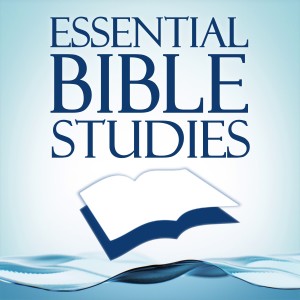
Monday Dec 27, 2021
Season 4 Highlight Teaser
Monday Dec 27, 2021
Monday Dec 27, 2021
The next season of the Essential Bible Studies Podcasts starts on January 17th, 2022. Listen to some of the highlights coming up. It's going to be a great season of engaging Bible study and discovery. Don't miss it!
Subscribe on Apple Podcasts, Google, Spotify, Amazon Music or wherever you listen to podcasts.
Follow us on Facebook, Instagram, or Twitter.
Visit essentialbiblestudies.org and sign up for a free media kit and the online Bible Study Group.
Follow us on... Facebook: https://www.facebook.com/essentialbiblestudies Instagram: https://www.instagram.com/essentialbiblestudies/ X: https://x.com/bible_podcast Get it... Get an invite to our Tuesday night Bible Studies at essentialbiblestudies.org Request a free Essential Bible Studies media kit
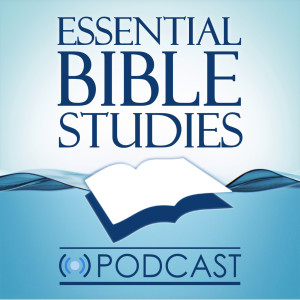
Monday Dec 06, 2021
Season 4 Trailer
Monday Dec 06, 2021
Monday Dec 06, 2021
Season 4 of the Essential Bible Studies Podcast drops on January 17th, 2022. Listen in to find out what is coming!
Follow us on... Facebook: https://www.facebook.com/essentialbiblestudies Instagram: https://www.instagram.com/essentialbiblestudies/ X: https://x.com/bible_podcast Get it... Get an invite to our Tuesday night Bible Studies at essentialbiblestudies.org Request a free Essential Bible Studies media kit
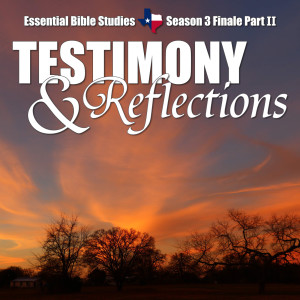
Monday Apr 05, 2021
Testimony and Reflections Season 3 (Part 2)
Monday Apr 05, 2021
Monday Apr 05, 2021
This is the second part to our season three testimony. Stan Isbell continues the amazing story of how God has worked in his life. Stan recalls considering ending his life before one conversation would change everything. Along the way Stan relates lessons learned through the years and how we can more effectively preach the word of God to others.
The chart of God's 7000 Year Plan that changed Stan's life can be found here.
The cover photo is from the Texas Christadelphian Camp and Conference Center, a place dear to Stan, but that's another story. Photo courtesy of @hannah.young104.
Follow us on... Facebook: https://www.facebook.com/essentialbiblestudies Instagram: https://www.instagram.com/essentialbiblestudies/ X: https://x.com/bible_podcast Get it... Get an invite to our Tuesday night Bible Studies at essentialbiblestudies.org Request a free Essential Bible Studies media kit
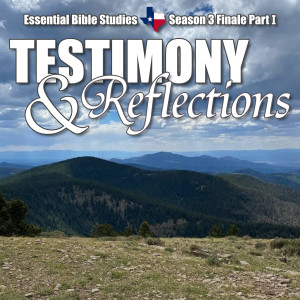
Monday Mar 29, 2021
Testimony and Reflections Season 3 (Part 1)
Monday Mar 29, 2021
Monday Mar 29, 2021
For our season three testimony we welcome Stan Isbell to share his story of how God has worked in his life. Stan recalls his early life in Texas, the experiences that led him to drug addiction, and to thoughts of ending his life before God stepped in and brought him back from the abyss. The is the first of a two part series because it is so amazing.
Follow us on... Facebook: https://www.facebook.com/essentialbiblestudies Instagram: https://www.instagram.com/essentialbiblestudies/ X: https://x.com/bible_podcast Get it... Get an invite to our Tuesday night Bible Studies at essentialbiblestudies.org Request a free Essential Bible Studies media kit

Monday Mar 22, 2021
You are gods
Monday Mar 22, 2021
Monday Mar 22, 2021
This is the second of a two part study on Jesus' words in John 10:22-38. In response to the Jews accusing Jesus of making himself equal with God, Jesus quoted Psalm 82:6 "I said, you are gods." What did Jesus mean by this and how did it help to answer his antagonists? Tim Young and Tom Colby find the answer in the context of Psalm 82. Follow this lead and you'll see the wonder and beauty of Jesus' response.
Episode Outline
Introduction
Previous podcast, setting the scene (John 10:22-24)
Jesus’ answer is quoting from Psalm 82:6
Understanding Psalm 82 and God Manifestation
Elohim = judges (Ex. 22:8-9; Deut. 1:16-17; 2 Chr. 19:5-7)
Using this to better understand Psa. 82:1,6. The judges were supposed to manifest God.
Relating this back to Jesus’ argument in John 10:34-36
Conclusion
This is how Jesus and the Father are one (John 10:38)
We too must strive to manifest God (John 17:20-22)
Follow us on... Facebook: https://www.facebook.com/essentialbiblestudies Instagram: https://www.instagram.com/essentialbiblestudies/ X: https://x.com/bible_podcast Get it... Get an invite to our Tuesday night Bible Studies at essentialbiblestudies.org Request a free Essential Bible Studies media kit
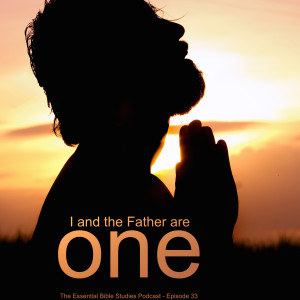
Monday Mar 15, 2021
I and the Father are One
Monday Mar 15, 2021
Monday Mar 15, 2021
This is the first of a two part study on Jesus' words in John 10:22-38. In verse 30 Jesus said, "I and the Father are one". It's important to understand the context of the argument Jesus is having with the Jews. Tom Colby and Tim Young spend some time unraveling the meaning of this phrase to reveal a very important Bible principle called God manifestation. This is the culmination of some of the studies we've been having this season. It is sure to make you appreciate the Lord Jesus Christ more and how we pray to be one with him as he is with the Father.
Episode Outline
Introduction
Previous podcasts on God manifestation… and now we study how it relates to Jesus using John 10:22-38
Setting the scene (John 10:22-24)
Jesus manifesting the name
The works I do in my Father’s name (John 10:25) cp. “I am come in my Father’s name (John 5:43-44)
Given a name above all names (Phil. 2:9-11)
What does it mean God and Jesus are one?
Not the Trinity. My Father is greater than all (v. 29) seems contradictory to “I and my Father are one” (v. 30). How do we explain this?
Comparing to Jesus’ prayer in chapter 17
Jesus’ manifested the name (17:6)
The oneness of the Father, Jesus and all believers (17:11, 21-26)
Conclusion
The reaction of the Jews
The answer of Jesus saved for the next podcast
Follow us on... Facebook: https://www.facebook.com/essentialbiblestudies Instagram: https://www.instagram.com/essentialbiblestudies/ X: https://x.com/bible_podcast Get it... Get an invite to our Tuesday night Bible Studies at essentialbiblestudies.org Request a free Essential Bible Studies media kit
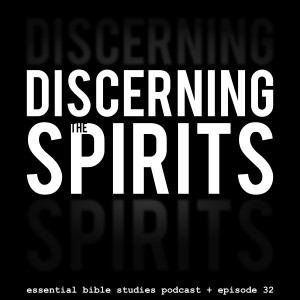
Monday Mar 08, 2021
Discerning the Spirits
Monday Mar 08, 2021
Monday Mar 08, 2021
How did Christians living in the first century know what was true and what should be included in the Bible? How can we be confident what is in the Bible is what is supposed to be there? The answer is in the Bible. Jay Mayock and Tim Young discuss the role of prophets and how the Holy Spirit gifts of the first century were used to test the prophet's words to be true or false. This essential Bible study brings us confidence in the Bible as the word of God and provides the tools to reject false doctrines.
Theme Verse – 2 Timothy 2:15
“Do your best to present yourself to God as one approved, a worker who has no need to be ashamed, rightly handling the word of truth.”
Show Outline:
The Gospel of Judas
A copy was found that is 1700 years old
Released in 2006 (National Geographic published an article)
Reverses the role of Judas, vindicates him as the one who understood Jesus
There were lots of ‘false gospels’ circulated in the early days of Christianity
How did first century Christians know what was really the word of God?
The Role of Prophets
Both foretelling and forthtelling the word of God – lexicons and context
True vs. False prophets (18:20-22)
Jeremiah vs. Hananiah (28:2-4, 10-11)
Agabus (Acts 11:27-30)
Prophecy: One of the Spirit Gifts
Prophets were one of the most important gifts (3:5)
The whole point of the gifts was to build up the whole ecclesia (4:11-16)
All members had to work together to help each other
Specifically, prophets had to work together with ‘provers’
Authenticating the Word – An Ecclesial Work
Context #1 – Spirit, prophecy, discerning, spiritual good for all (1 Cor. 12:4,10,7)
Context #2 – Spirit, prophecy, weighing, spiritual learning and encouragement for all (1 Cor. 14:12,29,31)
Context #3 – Spirit, prophecy, testing, holding fast to good (1 Thes. 5:19-21)
Counterfeit messages! (2 Thes. 2:2; 1 John 4:1; Rev. 2:2)
The church, ecclesia, need to work together to develop the unity of the faith
They did attain it, because the gifts were withdrawn! (4:13-14)
Lessons for Us Today
The prophets’ words were confirmed in part through the accuracy of their predictions, and also by those who had the gift to discern, weigh the spirits.
The gifts of the Holy Spirit were withdrawn after the ecclesias attained unity in the faith.
‘False’ gospels do not undermine our NT.
Now that we have received the word of God from the prophets, we must test any teaching with that word. In short, we must: “Do your best to present yourself to God as one approved, a worker who has no need to be ashamed, rightly handling the word of truth.” (2 Tim. 2:15)
Follow us on... Facebook: https://www.facebook.com/essentialbiblestudies Instagram: https://www.instagram.com/essentialbiblestudies/ X: https://x.com/bible_podcast Get it... Get an invite to our Tuesday night Bible Studies at essentialbiblestudies.org Request a free Essential Bible Studies media kit
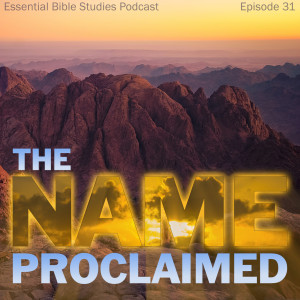
Monday Mar 01, 2021
The Name Proclaimed
Monday Mar 01, 2021
Monday Mar 01, 2021
This is the second of a two part study on Exodus 33 and 34 (the first part is here). We ascend the mountain with Moses to have the name of Yahweh revealed to us. Tim Young and Stephen Macfarlane discuss this surprising and powerful revelation and what it means for us in our discipleship.
The cover photo is from the summit of Mt. Sinai. Photo credit: Mohammed Moussa - Own work, CC BY-SA 3.0, Link
Follow us on... Facebook: https://www.facebook.com/essentialbiblestudies Instagram: https://www.instagram.com/essentialbiblestudies/ X: https://x.com/bible_podcast Get it... Get an invite to our Tuesday night Bible Studies at essentialbiblestudies.org Request a free Essential Bible Studies media kit

Monday Feb 22, 2021
Show Me Your Glory
Monday Feb 22, 2021
Monday Feb 22, 2021
In this first of a two part study on Exodus 33 and 34, Stephen Macfarlane joins Tim Young to dig deeper into the record to see how Moses sought to know God. The divine name had been revealed earlier to Moses (see this podcast) but Moses still desired to know God more intimately. These chapters serve as key studies to show us how we too should seek after God, to know him and to manifest his name.
The cover photo is from the summit of Mt. Sinai. Photo credit: Mohammed Moussa - Own work, CC BY-SA 3.0, Link
Follow us on... Facebook: https://www.facebook.com/essentialbiblestudies Instagram: https://www.instagram.com/essentialbiblestudies/ X: https://x.com/bible_podcast Get it... Get an invite to our Tuesday night Bible Studies at essentialbiblestudies.org Request a free Essential Bible Studies media kit
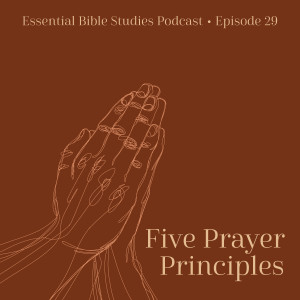
Monday Feb 15, 2021
Five Prayer Principles
Monday Feb 15, 2021
Monday Feb 15, 2021
Prayer is a struggle for many of us. How do I pray? What do I pray for? How do I know my prayers will be answered? We should not feel alone in this because even the Lord’s disciples struggled with how to pray. They asked in Luke 11:1, “Lord teach us to pray.” In this episode we look at five key prayer principles that can draw us closer to God and make prayer more practical. How can we make it part of our everyday lives and see the power that prayer provides.
Thanks to Words in Season for the cover art. Check out the etsy shop for cards, stickers and prints.
Episode Notes
You may be surprised to know that over 600 prayers are recorded in the Bible with over 450 revealed answers associated with those prayers.
So the Bible has a lot to say about prayer and the principles of prayer which can really help us in very practical ways as we offer prayer. What we learn as we look at prayer is that prayer has a purpose.
Seems like an odd thing to say, of course they do, otherwise why am I praying. Actually, what we see is that prayers are made with an expectant result in mind.
First, what is PRAYER? A person who did a lot of study on this subject once gave this definition and I think it is a good one, “prayer is the raising of the heart and mind to God … in short communication with God on high.” Prayer is an incredible gift God has given us in that we are able to talk to him and in turn as we read His word the Bible, He talks to us…communication takes place.
How do we learn to pray? … that ultimately comes by doing it, by practice.
Some view prayer like a 911 call only to be used in the case of emergencies. If they get what they ask for they may or may not express thankfulness and let that lead them into a better understanding of prayer.
But if they do not get what they asked for, they question whether prayer works or worse whether religion is worthwhile or not.
If we view prayer as something only to be used in times of trouble or we doubt whether prayers are heard because we did not get the answer we asked, if we are not sure what to pray for or even how to go to about praying altogether … we hope our thoughts together will help either change our view of prayer or provide us with a more focused direction on what to pray for and how to go about it.
The Lord tells us we have only 2 real choices on this subject …
Prayer Principle 1 - We Pray or we Faint!
So one of the first Key Principles of Prayer we learn is: that prayer needs to be consistent and constant …
Luke 18:1 “And he spake a parable unto them to this end, that men ought always to pray, and not to faint;”
We either pray rightly or lose heart …faint. (Gk ekkakeo “to be utterly spiritless, wearied out, exhausted”) … that is how critical prayer really is.
If we do not pray we faint. Notice the Lord says “ought” to pray… it is our duty to pray, an obligation, absolutely necessary for our spiritual health.
WE NEED GOD’S HELP - our attitude to that fact, affects how we pray and if we pray … need to see how important prayer really is to us
As we look at Principles regarding prayer, we need to be aware of one of the major challenges we face today (this challenge has a major effect on us as well as our children, young people in general) … that being in society today we are so far removed from absolute dependence on God. This then results in an adverse affect on our prayers.
Let me illustrate what I mean by this by looking at what I call the Lettuce effect. Where does a head of lettuce come from? If you were to ask a child (and I did) they will tell you it comes from the store! Some adults might think the same way as well!! We live in an age that is less dependent on the land. Very few if any of us are farmers. So easily for us to overlook our need for God and overlook our material blessings & dependence on Him.
Man has created his own light system and water systems all driving us further from God dependence. We have created an infrastructure that is comprised of seed warehouses, sorting areas, refrigerated warehouses, transportation to move things vast distances so we can bring our lettuce from Mexico or even further away.
Reality is that God is at the source of everything. No seedling, no food. We need to rekindle that absolute dependence on GOD, a recognition that we depend on Him for everything THIS is a vital part of prayer. God dependence.
We have a Father in heaven that supplies our needs … Here then is the absolute starting point for prayer … prayer requires a faithful belief in God’s existence and that He is the provider of all we require
Prayer Principle 2 – Believe that GOD Hears
Another key Principle of Prayer some might say is actually the most important one is outlined for us in the Epistle to the Hebrews - Hebrews 11:6 “ But without faith it is impossible to please him: for he that cometh to GOD must believe that he is, and that he is a rewarder of them that diligently seek him”
Need faith, (Faith in GOD) this must exist before prayer is really prayer at all.
Prayer Principle 3 – There is a Way to Pray (Pray the right way)
Another principle of prayer is the way in which we address our prayers and the purpose behind them. We learn about this from the instruction Paul gives in the epistle to the Ephesians 5:20 “Giving thanks always for all things unto God and the Father in the name of our Lord Jesus Christ”
Need the right spirit (humble - thankful) … recognize that God is the great Creator and that he is our Father …and that our prayers are offered in the name of LJC
It is also critical since we are praying in our Lord’s name that our prayers need to be in accord with God’s purpose. Our prayers then need to be aligned with our Heavenly Father’s will (One of the most vital of all the Prayer Principles)… we need to understand what that is.
If they are aligned … we can have full assurance they will be answered. “And this is the confidence that we have in him, that, if we ask any thing according to his will, he heareth us” 1 John 5:14
Creates in us confidence that prayers are heard and that they are powerful. Our petitions need to be in harmony with the purpose of God. In this way prayers are conditional … “Thy will be done” as our LJC says. To be fair, sometimes we may not even be aware of what the LORDS will is … at least acknowledge that we want His will to be done versus our own.
This leads us into considering what is the will of God vs what is our own will? We can illustrate this with a simple example we all can relate to in dealing with our NEEDS vs WANTS. What do we really need vs what do we want?
This is a topic we many times get wrong. Our basic NEEDS, God looks after them all for us. Roof over our head (place to live) - Food and water - Sufficient Health & Hygiene - Clothing to keep us warm or protected.
WANTS - are anything beyond that - we want a Mansion don’t need it! designer clothes, fancy car etc. We need to pray that God will provide us with what we need since he as a Loving Father knows best. If God gave us everything we wanted we would be in deep trouble. Sometimes we can pray for what God doesn't want. We are not teaching God in our prayers but beseeching Him.
Some things to avoid.
Need not be long although some occasions may require it (personal prayer perhaps).
Not repetitive - spontaneous with meaning - as the Lord says “for your Father knoweth what things ye have need of before ye ask” (Matt 6:8) - fact of divine foreknowledge does not make those prayers any less necessary for us or any less real to God.
Need not be showy in prayers as the Pharisees did on the street
In fact, praying in the right way is critical to developing a personal prayer life. Think of a children's prayer - they are very honest (they thank God for everything and pray for everyone - not encumbered by doubts & obstacles we as adults see) Childlike - humility, trust, dependence
The greatest obstacle to sincere praise is our pride and adult "wisdom" which is often little more than conceited ignorance. When we are humbled, we are in the position to offer the greatest praise.
Prayer with the right attitude: Make our words brief Matthew 6:7 / Humility Luke 18:13 / Be specific Philippians 4:6 / Reverential Ecclesiastes 5:2 / Habitually 1 Thessalonians 5:17
Prayer Principle 4 – Listen or God Won’t
There is also then a negative principle that is also true of Prayer… Sometimes this is caused by mixing up needs and wants. In other words we pray for the wrong reasons or we have an impediment making our prayers ineffective towards GOD.
In James’ epistle we are told of such a conditional principle of prayer “Ye ask, and receive not, because ye ask amiss, that ye may consume it upon your lusts.” (James 4:3)
The believers in the 1st century were asking for the wrong reasons. They wanted something that they could use for their own selfish ends. They were not getting an answer to their prayers as a result
Our treatment of others we can be challenge our receiving answers to our prayers:
Want mercy, must be merciful. Prayer is difficult when we have a grudge against God or what he wants us to do. Need to get wrong things out of our lives…otherwise prayers will be difficult. (ex. unconfessed sin)
This is an area of prayer we don’t often talk that much about. But God’s word is clear that there are times when prayers are not heard:
When pride is prevalent Job 35: 12
When iniquity is in our heart Psalms 66:18
If we forsake God Judges 10: 11-13
REFUSE to listen to God’s word Proverbs 28:9 “ He that turneth away his ear from hearing the law, even his prayer shall be abomination”
Wilfully disobedient Isaiah 1:15
Pray for selfish reasons James 4:3
What are some practical ways to help us pray for the right reasons:
- ask ourselves, what is the Higher Principle I need to think about in this prayer - is it forgiveness? is it love? is it health … for what reason?
- how can what I ask for or say, Give God glory, or ensure that He is glorified in what I’m requesting.
- is what I ask for Aligned with His will and if I’m unsure at least acknowledge in sincerity we want it to be according to His will and therefore we will be accepting of His answer because He knows better than we do.
- How does what we ask for advance His purpose?
how can I make my prayers more for others and less about myself?
Prayer Principle 5 – Prayer Works (God Answers Prayers)
Ephesians 3:20,21 "Now unto him that is able to do exceeding abundantly above all that we ask or think, according to the power that worketh in us, 21 Unto him be glory in the church by Christ Jesus throughout all ages, world without end. Amen."
- even more can be achieved than what we can even ask or think! - need for prayer comes by recognition we need God’s grace (all He has done for us) … we cannot do things on our own (recognition of our weakness & dependency) - that is why Ephesians 3:20, 21 is so powerful, we have limits, God does not …in times of joy, sadness and depression He is the only one who understands us and can help us … it is the method that God has given us to talk (communicate) with HIM
GOD answers our prayers … but His answers may come in different ways: TIME is the challenge, different for us versus GOD (need to see things from God’s eyes/ perspective where time is not limited - see time & opportunity are in God’s hand)
we tend to view time as a clock that goes around and around. Life is more like the old fashioned hour glass. For us it runs out.
For God time is infinite … no beginning or end, forever. Need to keep this in mind when it comes to answers to our prayers.
A couple of ways we get answers to our prayers:
Yes (sometimes so fast we may wonder if it is the answer) Acts 12: 5 “Peter therefore was kept in prison: but prayer was made without ceasing of the church unto God for him. And when she (Rhoda) knew Peter's voice, she opened not the gate for gladness, but ran in, and told how Peter stood before the gate. And they said unto her, Thou art mad. But she constantly affirmed that it was even so. Then said they, It is his angel.”
No - our petitions are not granted - No is an answer … it could also be not yet (…wait - not yet) Hebrews 11 - all died without receiving their prayers yet. (in time they will receive it)
Wait - could be silence (because it is best for us to wait at that time)/ Delay for the same reason - doesn't mean it wasn't heard at the moment we made it. Daniel 10:12 - Daniel prayed and did not receive an answer until 3 weeks later but the pray was heard on the first day he made it. “Fear not Daniel: for from the first day that thou didst set thine heart to understand …thy words were heard” (Don’t mistake silence for inactivity) - results may come in time.
Another Way - something quite often we did not expect or see - God had another way!
Note: all of these are answers! Never confuse not getting what we want as no answer!
We have the most powerful communication tool in the world let’s use it!!
1 John 3: 22 (KJV) “And whatsoever we ask, we receive of him, because we keep his commandments, and do those things that are pleasing in his sight.”
1 John 3:22 (ESV) “and whatever we ask we receive from him, because we keep his commandments and do what pleases him.”
Prayer Principle 1 – We Pray or we Faint!
Prayer Principle 2 – Believe that GOD Hears
Prayer Principle 3 – There is a way to Pray (Pray the right way)
Prayer Principle 4 – Listen or God won’t
Prayer Principle 5 – Prayer Works (God Answers Prayer)
Follow us on... Facebook: https://www.facebook.com/essentialbiblestudies Instagram: https://www.instagram.com/essentialbiblestudies/ X: https://x.com/bible_podcast Get it... Get an invite to our Tuesday night Bible Studies at essentialbiblestudies.org Request a free Essential Bible Studies media kit
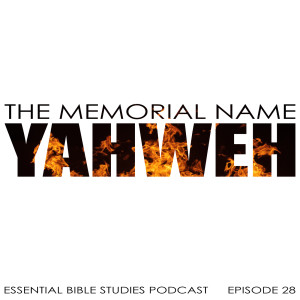
Monday Feb 08, 2021
The Memorial Name Yahweh
Monday Feb 08, 2021
Monday Feb 08, 2021
We feel like we are standing on holy ground in this episode. Frank Abel and Tim Young discuss the revelation of God's name of Yahweh before Moses at the burning bush in Exodus 3. What does this name mean and what does it tell us about God? This continues our studies about God and how he manifests himself.
Reference: The Usage and Translation of the Hebrew "ehyeh"
Episode Outline
Introduction
Exodus 3:3-4 - standing on holy ground – the importance of this topic
Moses asking questions Ex. 3:3,11,13 “What is your name?”
Exodus 3:14-15 The declaration of the name
The name is Yahweh v. 15 (in all caps)
Present or future tense? I AM as to existence or I WILL BE as to intent
Considering the context Ex. 3:12
Other examples are usually future unless context indicates it to be present tense
Exodus 6:23 "by Yahweh I was not known"
El Shaddai as a title for blessing
The fathers did not know or experience the covenant name even though they heard it from God and used it… “calling on the name of Yahweh” (e.g. Gen. 12:8 cp. Gen. 15:7-8)
Exodus 6:6-8 The name and what God says he will do
Emphasis “I am Yahweh” verses 2, 6, 8
Seven “I will” statements in v. 6-8
The meaning for us - God’s name is a memorial forever as he is “taking out of the Gentiles a people for his name” Acts 15:14
Follow us on... Facebook: https://www.facebook.com/essentialbiblestudies Instagram: https://www.instagram.com/essentialbiblestudies/ X: https://x.com/bible_podcast Get it... Get an invite to our Tuesday night Bible Studies at essentialbiblestudies.org Request a free Essential Bible Studies media kit
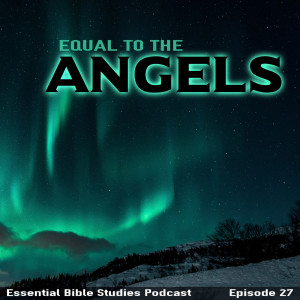
Monday Feb 01, 2021
Equal to the Angels
Monday Feb 01, 2021
Monday Feb 01, 2021
Jesus said that those who are resurrected to everlasting life will be "equal to the angels". If this is the case then we certainly want to know as much as we can about God's heavenly angels. Rob Alexander joins Tim Young to introduce us to this essential Bible study.
Key Verse:
“… those who are considered worthy to attain to that age and to the resurrection from the dead neither marry nor are given in marriage, for they cannot die anymore, because they are equal to angels and are sons of God, being sons of the resurrection.” (Luke 20:35-36)
Show Outline
Introduction
Why study angels? (Matt. 22:29-30; Luke 20:35-36)
Basics
Meaning of angel – messengers, can be either human or heavenly
We are made in the image of angels a.k.a. Elohim (Gen. 1:26 cp. Psa. 8:4-6; Heb. 2:7-9)
Angels appear as men (Gen. 18:2; Judges 13:16)
Angels also appear in glory (Matt. 28 – at Jesus’ tomb) but also can be invisible (Num. 22:31 – Balaam; 2 Kings 6:14-18 – Elisha and chariots of fire)
God manifestation
The curious case of Jacob wrestling an angel (Gen. 32:24,30)
Described as a man but an angel (v. 24; Hosea 12:4)
Jacob says he has seen God, face to face (v. 30; 1 Tim. 6:16)
Angels represent God (Ex. 3:2,4,6)
They take on his name (Ex. 23:20-21)
Final conclusion
Follow us on... Facebook: https://www.facebook.com/essentialbiblestudies Instagram: https://www.instagram.com/essentialbiblestudies/ X: https://x.com/bible_podcast Get it... Get an invite to our Tuesday night Bible Studies at essentialbiblestudies.org Request a free Essential Bible Studies media kit






